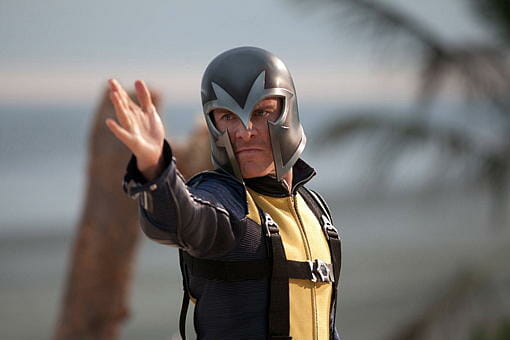By Peter Wertz · June 8, 2011

When you look at the scope of the Marvel Universe in regards to the films released in the last decade, it's all a bit of a mess. There's no shortage of disjointed timelines, relationships and character arcs, and to top if all off, Marvel productions seem perfectly content taking massive liberties with their own mythology. It's not a deal-breaker, for me or apparently for most, as X-Men: First Class stole it's opening weekend, but the discordance isn't so minor as to be invisible; a fact made even clearer when trying to reconcile the 1960s version of Magneto with his significantly more haggard 2000s self. Despite all that, Director Matthew Vaughn has put his own spin on an X-Men tale, and in the process made a film that, at the very least, stands with the best of the franchise.
First Class is devoted first and foremost to the disparity between its duo of protagonists, starting with a pair of childhood sequences illuminating Charles Xavier's (James McAvoy) and Erik Lehnsherr's (Michael Fassbender) dramatically different origins; Xavier's early years were spent in lavish elegance, Lehnsherr's being tortured in a WWII concentration camp. These childhood years formed in both men their driving ambitions, with Xavier adopting the physically aberrant Raven “Mystique” Darkholme (Jennifer Lawrence) and devoting himself to a future of genetic harmony, and Lehnsherr's torture at the hands of Sebastian Shaw (Kevin Bacon) urging him towards revenge and racial superiority. When the two men finally meet, it is as literal a yin-yang as you've ever seen. Were it not for Shaw's real threat as a terrorist, Xavier and Lehnsherr would find themselves with very little motivation to form a super team, and we wouldn't have the pleasure of meeting their misfit band of mutants: Hank “Beast” McCoy (Nicholas Hoult), Sean “Banshee” Cassidy (Caleb Landry Jones), and Alex “Havok” Summers (Lucas Till). Thank goodness for global threats.
The script for X-Men: First Class is impedingly ambitious. The X-Men have always depended more on their status as a team than any other Marvel hero squad, which means an abundance of characters is a necessary hurdle. What this means for the film though is a frustrating contrast between the characters you want to learn more about, and the characters you're forcedto learn more about. Maneuvering all of these characters into a cohesive group is a feat, both on paper and in the film's reality, but watching these young adults come together is simply not as interesting as the far more potent dynamic of Magneto and Professor X. And this is surely the biggest problem with Vaughn's X-Men, this neglect of the Xavier/Lehnsherr storyline. If nothing else, the performances from the film's two leads outstrip their younger castmates dramatically. Watching Fassbender and McAvoy in any of their few extended scenes together, apart from being good old-fashioned fun, forces viewers to imagine a film that had spent more time on the pair. This is an oft-forgotten aspect of the X-Men canon, but the complexity of these two characters and their relationship is vast, and the potential therein just hasn't been fully explored.
Kevin Bacon's role as the central protagonist may well be the most surprising positive, with Bacon bringing some exuberant villainy to the character of Shaw. Fundamentally just a terrorist, it is Shaw's charisma that keeps him from being one-sided. Meanwhile, Vaughn has paired Bacon's brilliant antagonist with the terribly boring and beautiful Emma Frost (January Jones). It's not so much that Jones is awful (though there's a case to be made); she has had some A-game moments with Mad Men. But here, she just doesn't know what to do with the character. Personally, I blame Vaughn. Not casting an icy Brit was his first and probably biggest mistake, as this frigidity is essentially what defines Ms. Frost. That said, there was still ample opportunity to give the character some, well, character.
To be clear, X-Men: First Class is not a bad film. It has a pair of leading actors who are stellar, and some of the best action sequences the franchise has produced. Vaughn is a legitimate talent who can mostly handle the scale of a massive studio production. What it is though is a missed opportunity. This film could have been a nice departure from the trilogy, and instead feels something like a Frankenstein production from a hovering studio and an obeisant director. Vaughn clearly understands where his story lies, but also seems preoccupied with how many action figures his film will produce. As far as summer fun goes, it is definitively a success. But a complex character piece that pulls out the best of the source material? Not so much.